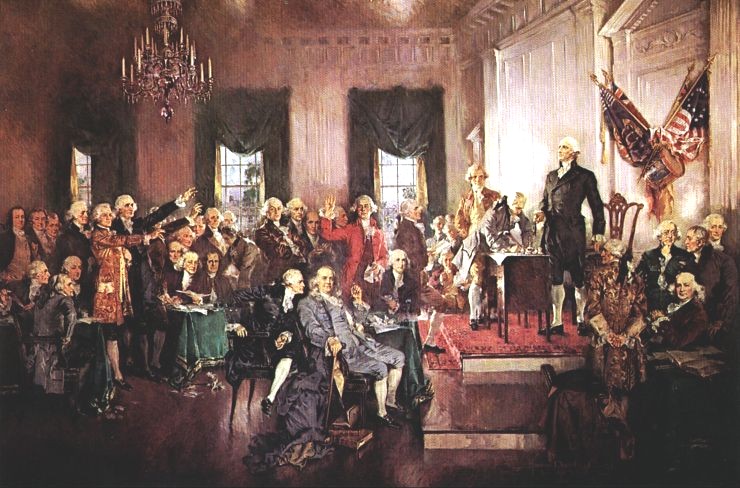An Assembly of Demigods
December 24, 2020

Observing events in the summer of 1787 from his diplomatic post at Paris, Thomas Jefferson referred to the sitting Constitutional Convention in America as “an assembly of demigods” likely to reach “good and wise” decisions. By contrast, in 1913 progressive historian Charles Beard described the Convention in economic terms as a cabal of propertied elites; the Convention’s delegates, according to Beard, were “immediately, directly, and personally interested in, and derived economic advantages from, the establishment of the new system.”
Perhaps the most meaningful line of division in modern American politics is not between Republicans and Democrats but between those who embrace the positive, Jeffersonian view of the Convention (as well as the broader American Founding) and those who accept the cynical, Beardian interpretation. Modern espousers of the Beardian view, for instance, joined in recent decades by peddlers of race and gender theories, dismiss the Founders as self-interested, racist, sexist, dead white men whose achievements and attitudes toward government should no longer concern us. On the other hand, those who argue for the Founders’ enduring relevance tend to agree with Jefferson’s observation that the men who gathered at Philadelphia beginning in May 1787 had good intentions and achieved something noble.
Perhaps those delegates’ greatest achievement is also the most easily overlooked: the simple fact of having written a constitution. It is worth noting that the men who framed the U.S. Constitution had come of age as subjects of the British Crown. They celebrated British liberty, which, they believed, was protected by the ancient British constitution. But the British constitution did not appear on parchment. It was, put simply, a loose set of institutional arrangements designed to balance the powers of king and Parliament. Americans rebelled, in short, because they came to realize after a decade of taxes and coercive legislation that the unwritten British constitution meant whatever the rulers of the moment said it did. This, the revolutionaries concluded, was inadequate security for American liberties. So they began writing constitutions in the states and then at the national level.
The Constitutional Convention’s second great achievement appears in the finished document’s famous preamble, which begins with the words “We the People.” Demigods or otherwise, the delegates lacked power to impose their work on their fellow citizens. As James Madison repeatedly noted, it was not the Constitutional Convention but rather the people’s state ratifying conventions that breathed life into the document. The U.S. Constitution did not evolve over time as a series of institutional arrangements; it was, as Alexander Hamilton tells us, a product of “reflection and choice” on the part of the citizens who adopted it.
Modern progressive statists demand that we treat our Constitution as a “living” document. In this they are not progressive but regressive, insisting, perhaps unwittingly, upon a return to the days of the unwritten British constitution. Americans, therefore, who wish to preserve limited and constitutional self-government, would do well to follow Jefferson and reflect with pride upon the Convention’s achievements, for it is the only way to preserve them.
Explore the many resources on the Constitutional Convention offered on Ashbrook’s Teaching American History website:
- An Introduction to the Convention with an overview of the questions delegates faced;
- A variety of detailed narratives of the events, including The Constitutional Convention as a Four Act Drama, a Day-by-Day Summary of the Convention, and a discussion of Major Themes at the Constitutional Convention,
- Biographical information on delegates to the Convention a list of committee assignments, and a record of who attended at critical moments in the debate;
- Testimony of the attendees themselves, in the form of correspondence and James Madison’s Notes of Debates in the Federal Convention of 1787;
- An interactive version of Christy’s Scene at the Signing of the Constitution of the United States as well as additional artistic interpretations of the Constitutional Convention;
- An Interactive Map of Historic Philadelphia in the Late 18th Century, which, along with an account of the Entertainment of George Washington at City Tavern in Philadelphia, will give readers an idea of what it meant to be one of the delegates in Philadelphia during that long steamy summer.


